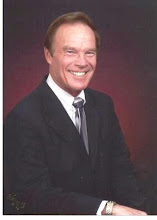Quarterback Eagle Day Won Big in Sports and Life

Eagle Day and I grew up less than a mile apart in the tiny town of Columbia, Mississipi. In high school, he became one of my early heroes, because of his remarkable athletic skills. Consider these achievements:
--Earned 16 letters at Columbia High School: football, baseball, basketball, track
--All-SEC Quarterback at Ole Miss, leading the team to consecutive SEC crowns
--Most valuable back in Cotton Bowl, where he spearheaded a victory over TCU
--Cotton Bowl, Missisippi, and Ole Miss Halls of Fame
--Played fourteen years of professional football, most valuable player in 1962 in the Canadian Football League
Thrilling as it was to watch my boyhood friend and idol go that far, Eagle Day turned into a different kind of hero for me after his playing days. He became a solid family man, civic and church leader, and supporter of his alma mater. He spoke at youth camps and churches, and volunteered for numerous charities. He helped young athletes hone their skills. Professionally, he established a successful insurance business, then became Executive Director of the Mississippi Motor Vehicle Commission.
On February 22,2008, this grand champion of athletics and life died from cancer. I have lost a lifelong friend. Let me share with you, though, Eagle Day's ten lessons from winning at life, as I understand them from our many discussions across several decades.
LESSON ONE: Keep an upbeat attitude. Across many years, whenever I would call Eagle and ask, "How are you doing?" he offered a one-word answer: "Fantastic." Life to him was fantastic. He endured setbacks like everybody else, but he considered them nothing more than temporary challenges.
LESSON TWO: Have a goal. I asked Eagle once, "How did you have the discipline to keep going--practicing, eating right, training, and avoiding the bad habits most of us had as teenagers? What made you stick with athletics so faithfully?" He answered: "I wanted to catch the bus out of town." He loved that little town,yet he knew that his talent and dedication could take him many more places.
LESSON THREE: Never envy anyone else. Eagle grew up in very moderate economic circumstances. He could have become bitter about his school mates who enjoyed many more privileges. But he never complained. In fact, he told me once, "The other man's grass might look greener. . .but did you ever try to mow it?"
LESSON FOUR: Don't let others intimidate you. "Bill," he told me, "I never think of myself as better than anybody else. At the same time, I never think of anybody else as better than me. We're all on equal footing."
LESSON FIVE: Prepare thoroughly. "At Calgary, I was the first player on the practice field, and the last to leave," he explained. At Ole Miss, he had 150 plays to remember, plus their various formations. "Before a big game, I might not sleep more than three hours, as I pictured every possibility, and how I would react." In his words, "Win before you ever hit the field."
LESSON SIX: Call on your teammates. As head of the Motor Vehicle Division, he spent many hours preparing his board chairman for a leadership role in the meetings.
LESSON SEVEN: Always be available to those who need you. In 1975, my mother suffered a severe stroke, and was hospitalized in Jackson. I called Eagle, and told him how much it would mean if he visited my distraught, aged father. Eagle came to the hospital that afternoon. Immediately, I could see my father's spirits lifted.
LESSON EIGHT: Take a risk when you have the ability. Ole Miss was losing that 1956 Cotton Bowl in the closing minutes. Ole Miss had the ball, but it was fourth down. Eagle knew that Coach Johnny Vaught wanted Eagle to punt. Eagle had confidence he could complete a pass. He did, to get the first down. Shortly afterward, Eagle ran 25 yards to the five yard line. The score on the next play, plus the extra point, assured the 14-13 victory over TCU. Sports writers dubbed Eagle "The Mississippi Gambler." He disagreed, saying he knew all along he could make the fourth down pass play work.
LESSON NINE: Take pride in your appearance. Coach Vaught instilled that in his players--"Look good, and you'll feel like a champion." While others welcomed "business casual" and carried it to sloppy extremes, Eagle invariably looked like a man out of Esquire.
LESSON TEN: Look beyond human help. For many years, Eagle was active in Jackson's First Baptist Church. He ushered and attended Tuesday Bible study lunch meetings. In a speech to a men's group at the church, he concluded with: "Don't remember me as number 19 (his football jersey number). Instead, remember me as a man of integrity."
Shortly after Eagle's untimely death, I remembered what Vince Lombardi said about the Green Bay Packers: "We never lost a game. Sometimes the clock just ran out." I can assure you, Eagle Day was a winner in every phase of life. The clock ran out, but the score is in his favor nevertheless.
NOTE: Eagle Day's inspiring story plays a prominent role in my audio CD, "Maintaining Maximum Motivation: Strategies for Staying in High Gear!" To order your CD today and hear more about "The Mississippi Gambler"use this link to my online store (for orders within the U.S. only):
http://www.ChampionshipCommunication.com/store/index.htm

